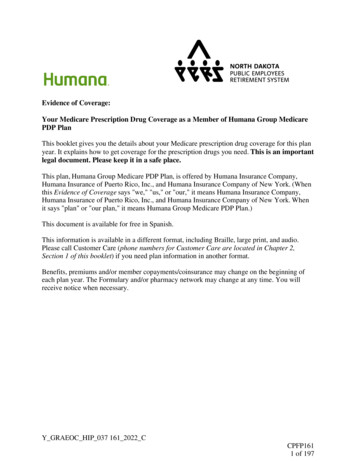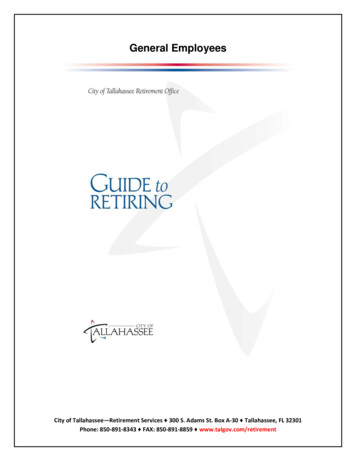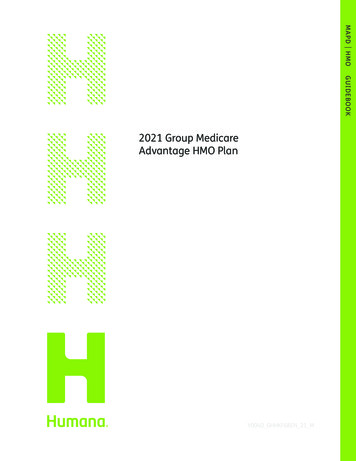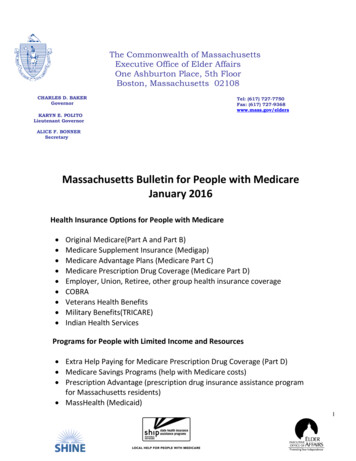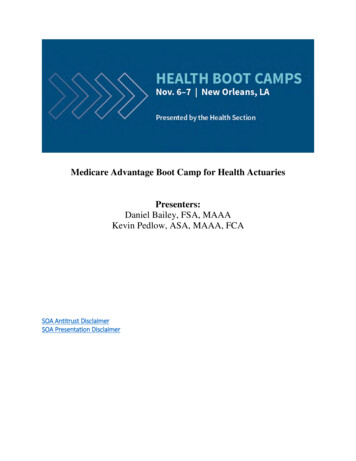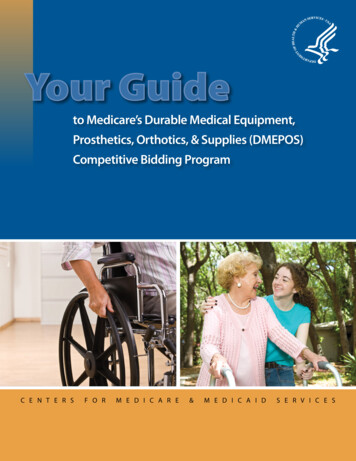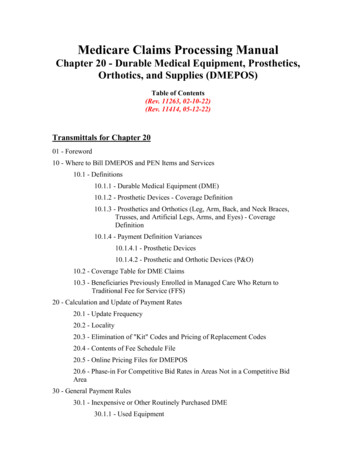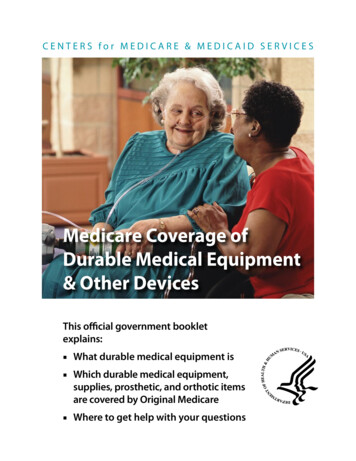
Transcription
CENTERS for MEDICARE & MEDICAID SERVICESMedicare Coverage ofDurable Medical Equipment& Other DevicesThis official government bookletexplains: What durable medical equipment is Which durable medical equipment,supplies, prosthetic, and orthotic itemsare covered by Original Medicare Where to get help with your questions
Does Medicare cover durablemedical equipment (DME) or othertypes of medical equipment?Definitionsof bluewords areon pages18–19.This booklet explains Original Medicare coverage of DME and what youmight need to pay. DME includes items like: Home oxygen equipmentHospital bedsWalkersWheelchairsThis booklet also explains coverage for prosthetic devices (like ostomysupplies, urinary catheters, enteral nutrition, and certain eyeglasses andcontact lenses), leg, arm, neck, and back braces (“orthotics”), and artificiallegs, arms, and eyes. It’s important to know what Medicare covers and whatyou may need to pay. Talk to your doctor if you think you need some typeof DME.If you have questions about the cost of DME or coverage after reading thisbooklet, call 1-800-MEDICARE (1-800-633-4227). TTY users can call1-877-486-2048.Note: The information in this booklet describes the Medicare Program atthe time this booklet was printed. Changes may occur after printing. VisitMedicare.gov, or call 1-800-MEDICARE (1-800-633-4227) to get the mostcurrent information. TTY users can call 1-877-486-2048.“Medicare Coverage of Durable Medical Equipment & Other Devices” isn’ta legal document. Official Medicare Program legal guidance is contained inthe relevant statutes, regulations, and rulings.This product was produced at U.S. taxpayer expense.
3CMS Accessible CommunicationsThe Centers for Medicare & Medicaid Services (CMS) provides free auxiliaryaids and services, including information in accessible formats like braille,large print, data or audio files, relay services and TTY communications.If you request information in an accessible format from CMS, you won’t bedisadvantaged by any additional time necessary to provide it. This meansyou’ll get extra time to take any action if there’s a delay in fulfilling yourrequest.To request Medicare or Marketplace information in an accessible format youcan:1. Call us:For Medicare: 1-800-MEDICARE (1-800-633-4227)TTY: 1-877-486-20482. Send us a fax: 1-844-530-36763. Send us a letter:Centers for Medicare & Medicaid ServicesOffices of Hearings and Inquiries (OHI)7500 Security Boulevard, Mail Stop S1-13-25Baltimore, MD 21244-1850Attn: Customer Accessibility Resource StaffYour request should include your name, phone number, type of informationyou need (if known), and the mailing address where we should send thematerials. We may contact you for additional information.Note: If you’re enrolled in a Medicare Advantage Plan or MedicarePrescription Drug Plan, contact your plan to request its information in anaccessible format. For Medicaid, contact your State or local Medicaid office.
4Nondiscrimination NoticeThe Centers for Medicare & Medicaid Services (CMS) doesn’t exclude, denybenefits to, or otherwise discriminate against any person on the basis of race,color, national origin, disability, sex, or age in admission to, participation in,or receipt of the services and benefits under any of its programs and activities,whether carried out by CMS directly or through a contractor or any otherentity with which CMS arranges to carry out its programs and activities.You can contact CMS in any of the ways included in this notice if you haveany concerns about getting information in a format that you can use.You may also file a complaint if you think you’ve been subjected todiscrimination in a CMS program or activity, including experiencingissues with getting information in an accessible format from any MedicareAdvantage Plan, Medicare Prescription Drug Plan, State or local Medicaidoffice, or Marketplace Qualified Health Plans. There are three ways to file acomplaint with the U.S. Department of Health and Human Services, Office forCivil Rights:1. plaint-process/index.html.2. By phone:Call 1-800-368-1019. TTY users can call 1-800-537-7697.3. In writing: Send information about your complaint to:Office for Civil RightsU.S. Department of Health and Human Services200 Independence Avenue, SWRoom 509F, HHH BuildingWashington, D.C. 20201
5What’s durable medical equipment (DME)?DME is reusable medical equipment, like walkers, wheelchairs, or hospital beds.If I have Medicare, can I get DME?Anyone who has Medicare Part B (Medical Insurance) can get DME as long as theequipment is medically necessary.When does Original Medicare cover DME?Part B covers DME when your doctor or other health care provider (like a nursepractitioner, physician assistant, or clinical nurse specialist) prescribes it foryou to use in your home. A hospital or nursing home that’s providing you withMedicare-covered care can’t qualify as your “home” in this situation. However, along-term care facility can qualify as your home.Note: If you’re in a skilled nursing facility (SNF) as part of a stay covered underMedicare Part A (Hospital Insurance), the facility is responsible for providing anyDME you need while you’re in the facility for up to 100 days.What if I need DME and I’m in a Medicare AdvantagePlan?Medicare Advantage Plans must cover the same medically necessary items and servicesas Original Medicare (Part A and Part B). Your specific costs will depend on whichMedicare Advantage Plan you have.Definitionsof bluewords areon pages18–19.If you’re in a Medicare Advantage Plan and you need DME, call your MedicareAdvantage Plan’s primary care provider to find out if your plan will provide the DME.If your Medicare Advantage Plan won’t cover a DME item or service that you believeyou need, you can appeal your Medicare Advantage Plan’s denial of coverage and getan independent review of your request for coverage. You can also find a descriptionof your Medicare Advantage Plan cost-sharing obligation for all Medicare coveredservices, including supplemental benefits offered by your Medicare Advantage Plan, inits “Evidence of Coverage” document.If you’re getting home care or using medical equipment and you choose to joina new Medicare Advantage Plan, call your new primary care provider as soon aspossible to make sure they’ll continue to cover any Medicare DME items or servicesyou’re using.
6Note: If your plan leaves Medicare and you’re using medical equipment, likeoxygen or a wheelchair, call the phone number on your Medicare Advantage Plancard and ask about DME coverage options. They can tell you how to get care underOriginal Medicare or a new Medicare Advantage Plan.If I have Original Medicare, how do I get the DME I need?If you need DME in your home, your doctor or treating provider (like a nursepractitioner, physician assistant, or clinical nurse specialist) must prescribe thetype of equipment you need by filling out an order. For some equipment, Medicaremay also require your doctor to provide additional information documenting yourmedical need for the equipment. Your supplier will work to make sure your doctorsubmits all required information to Medicare. If your needs and/or conditionchanges, your doctor must complete and submit a new, updated order.Medicare only covers DME if you get it from a supplier enrolled in Medicare.This means that the supplier has been approved by Medicare and has a Medicaresupplier number.Durable Medical Equipment, Prosthetics, Orthotics, and Supplies(DMEPOS) Competitive Bidding ProgramIf you live in or visit a competitive bidding area and need an off-the-shelf backor knee brace that’s included in the DMEPOS Competitive Bidding Program,you generally must use specific suppliers called “contract suppliers,” if you wantMedicare to help pay for the item. Contract suppliers are required to provide theitem to you and accept assignment as a term of their contract with Medicare.Definitionsof bluewords areon pages18–19.Visit Medicare.gov/supplierdirectory to find suppliers who can provide you withyour off-the-shelf back or knee brace. If you live in a competitive bidding area,the directory will only display contract suppliers for your area. You can also call1-800-MEDICARE (1‑800‑633‑4227) if you need help, you’re having problemswith your DME supplier, or you need to file a complaint. TTY users can call1-877-486-2048.
7What questions can I ask to help me when I’m looking fora supplier?You can ask questions like these: Are you a Medicare-enrolled supplier? Do you accept assignment? If you don’t accept assignment, will you consider assignment in my case? If you won’t consider assignment, what’s your non-assignment charge? Will you bill Medicare for me?A supplier enrolled in Medicare must meet strict standards to qualify for a Medicaresupplier number. If your supplier doesn’t have a supplier number, Medicare won’tpay your claim, even if your supplier is a large chain or department store that sellsmore than just DME.Does Medicare cover power wheelchairs & scooters?For Medicare to cover a power wheelchair or scooter, your doctor must state that youneed it because of your medical condition. Medicare won’t cover a power wheelchair orscooter that you only need and use outside of the home.Most suppliers who work with Medicare are honest. However, there are a few whoaren’t. For example, some suppliers of medical equipment try to cheat Medicare byoffering expensive power wheelchairs and scooters to people who don’t qualify forthese items.For more information about Medicare’s coverage of power wheelchairs or scooters,visit Medicare.gov/coverage/wheelchairs-scooters or call 1-800-MEDICARE(1-800-633-4227). TTY users can call 1-877-486-2048.What if my equipment needs maintenance or repairs?It’s important to know how to get maintenance and repairs for your durable medicalequipment. If you own your equipment, the supplier who sold it to you isn’t required to repairit. Visit Medicare.gov/supplierdirectory to find a supplier who can maintain orrepair your equipment. If you rent equipment, your supplier must maintain and repair the equipmentand keep it in good working order at all times. Your supplier must answer yourcalls and service, repair, or replace rented equipment whenever necessary. If yoursupplier doesn’t respond to your requests, call 1-800-MEDICARE.
8What if my equipment or supplies are lost ordamaged in a disaster or emergency?If Original Medicare already paid for DME or supplies lost or damaged due toan emergency or disaster: In certain cases, Medicare will cover the cost to replace your equipment orsupplies. Generally, Medicare will also cover the cost of loaned equipment for items(like wheelchairs) during the time your equipment is being repaired.If you’re in a Medicare Advantage Plan or other Medicare health plan,contact your plan directly to find out how it replaces DME or supplies lost ordamaged in an emergency or disaster.You can also call 1-800-MEDICARE (1-800-633-4227) to get moreinformation about how to replace your equipment or supplies. TTY users cancall 1-877-486-2048.What does Medicare cover & how much does it cost?See pages 9–11 for some of the items Medicare covers and how muchyou have to pay for them. This list doesn’t include all covered DME. Forquestions about if Medicare covers a particular item, visit Medicare.gov or call1-800-MEDICARE. If you have a Medigap policy, it may help cover some ofthe costs listed on pages 9–11.Definitionsof bluewords areon pages18–19.
9Durable medical equipment (DME)What Medicare covers Pressure-reducing beds, mattresses, and mattress overlays used to preventbed sores Blood sugar monitors Blood sugar (glucose) test strips Canes (however, Medicare doesn’t cover white canes for the blind) Commode chairs Continuous passive motion (CPM) machines Crutches Hospital beds Infusion pumps and supplies (when necessary to administer certaindrugs) Manual wheelchairs and power mobility devices (power wheelchairs orscooters needed for use inside the home) Nebulizers and some nebulizer medications (if reasonable and necessary) Oxygen equipment and accessories Patient lifts to lift you from a bed or wheelchair Sleep apnea and Continuous Positive Airway Pressure (CPAP) devices andaccessories Suction pumps Traction equipment WalkersWhat you payGenerally, you pay 20% of the Medicare-approved amount after you payyour Part B deductible for the year. Medicare pays the other 80%. TheMedicare-approved amount is the lower of the actual charge for the item orthe fee Medicare sets for the item.The amount you pay may vary because Medicare pays for different kinds ofDME in different ways. You may be able to rent or buy the equipment.
10Prosthetic & orthotic itemsWhat Medicare covers Arm, leg, back, and neck braces (orthotics)Artificial limbs and eyesBreast prostheses (including a mastectomy bra) after a mastectomyOstomy bags and certain related suppliesUrological suppliesTherapeutic shoes or inserts for people with diabetes who have severediabetic foot disease.–– The doctor who treats your diabetes must certify your need fortherapeutic shoes or inserts. A podiatrist or other qualified doctormust prescribe the shoes and inserts. A doctor or other qualifiedindividual (like a pedorthist, orthotist, or prosthetist) must fitand provide the shoes. Part B covers the furnishing and fitting ofeither one pair of custom-molded shoes and inserts or one pairof extra-depth shoes each calendar year. Medicare also covers 2additional pairs of inserts each calendar year for custom-moldedshoes and 3 pairs of inserts each calendar year for extra-depthshoes. Medicare may cover shoe modifications instead of inserts.Important: To get an off-the-shelf back or knee brace in most areas of thecountry, you generally must use specific suppliers called “contract suppliers.”Otherwise, Medicare won’t pay and you’ll likely pay full price. See page 6 formore information.What you payYou pay 20% of the Medicare-approved amount after you pay your Part Bdeductible for the year. Medicare pays the other 80%. These amounts maybe different if the supplier doesn’t accept assignment. See page 12.
11Corrective lensesWhat Medicare coversProsthetic lenses: Cataract glasses (for Aphakia or absence of the lens of the eye) Conventional glasses or contact lenses after surgery with insertion of anintraocular lens Intraocular lensesImportant: Only standard frames are covered. Medicare will only pay forcontact lenses or eyeglasses provided by a supplier enrolled in Medicare nomatter who submits the claim (you or your supplier).What you payMedicare will cover one pair of eyeglasses or contact lenses aftereach cataract surgery with an intraocular lens. You pay 20% of theMedicare-approved amount after you pay the Part B deductible for the year.Medicare pays the other 80%. Costs may be different if the supplier doesn’taccept assignment. See page 12. If you want to upgrade the frames, you payany additional cost.Definitionsof bluewords areon pages18–19.
12What’s assignment?Assignment means that your doctor, provider, or supplier agrees (or isrequired by law) to accept the Medicare-approved amount as full payment forcovered services.If your doctor, provider, or supplier accepts assignment: Your out-of-pocket costs may be less. They agree to charge you only the Medicare deductible and coinsuranceamount and usually wait for Medicare to pay its share before asking you topay your share. They have to submit your claim directly to Medicare and can’t charge youfor submitting the claim.Some providers haven’t agreed and aren’t required by law to accept assignmentfor all Medicare-covered services, but they can still choose to accept assignmentfor individual services. The providers who haven’t agreed to accept assignmentfor all services are called “non-participating.” You might have to pay more fortheir services if they don’t accept assignment for the care they provide to you.How will I know if I can buy DME or if Medicare willonly pay for me to rent it?If your supplier is a Medicare-enrolled supplier, they’ll know if Medicareallows you to buy a particular kind of DME, or just pays for you to rentit. Medicare pays for most DME on a rental basis. Medicare only buysinexpensive or routinely bought items, like canes, walkers, and blood sugarmonitors, or complex rehabilitative power wheelchairs. For some moreexpensive equipment, like wheelchairs and hospital beds, Medicare pays torent the item for 13 months of continuous use. Once the 13th month of rentalends, the supplier must transfer ownership of the equipment to you.Definitionsof bluewords areon pages18–19.
13Buying equipmentIf you own Medicare-covered DME and other devices, Medicare may also coverrepairs and replacement parts. Medicare will pay 80% of the Medicare-approvedamount (up to the cost of replacing the item) for repairs. You pay the other 20%.Your costs may be higher if the supplier doesn’t accept assignment.Note: The equipment you buy may be replaced if it’s lost, stolen, damaged beyondrepair, or used for more than the reasonable useful lifetime of the equipment, which isgenerally 5 years from the date you start using the item.Renting equipmentIf you rent DME and other devices, Medicare makes monthly payments for use ofthe equipment. How long monthly payments continue vary based on the type ofequipment. Total rental payments for inexpensive or routinely bought items arelimited to the fee Medicare sets to buy the item. If you’ll need these items for morethan a few months, you may decide to buy these items instead of rent them. Monthlypayments for frequently serviced items, like ventilators, are made as long as theequipment is medically necessary. You pay 20% of the Medicare-approved amountafter you pay your Part B deductible for the year. Medicare pays the other 80%.The supplier will pick up the equipment when you no longer need it. Any costs forrepairs or replacement parts for the rented equipment are the supplier’s responsibility.The supplier will also pick up the rented equipment if it needs repairs. You don’t haveto bring the rented equipment back to the supplier.Do I need to tell my supplier if my needs change?You may need to tell your supplier about changes in your life that will affect how andwhen you get your durable medical equipment. Let your supplier know if: You’re changing insurance companies.You’re changing doctors.You’re in the hospital or will soon be admitted to the hospital.You’re in a nursing home or will soon be admitted to a nursing home.You’re traveling.You’re moving.You or your secondary contact have changed your phone number.If you use oxygen and you’ll need a portable oxygen concentrator (POC) for travel,let your supplier know weeks in advance.
14How does Medicare pay the supplier for oxygenequipment & related supplies?If you have Medicare and use oxygen, you can rent oxygen equipment from asupplier for as long as you have a medical need, but payments for the equipmentstop after 36 months of continuous use. After 36 months, your supplier mustcontinue to provide oxygen equipment and related supplies for an additional 24months. Your supplier must provide equipment and supplies for up to a total of 5years, as long as you have a medical need for oxygen.What do I pay the supplier? What does the rentalpayment cover?The monthly rental payments to the supplier cover your oxygen equipment,and any supplies and accessories, like tubing or a mouthpiece, oxygen contents,maintenance, servicing, and repairs. If you use portable oxygen equipment,there’s a separate monthly payment made in addition to the general monthlypayment, which also ends after 36 months. In both cases, you pay 20% of theMedicare-approved amount after you pay your Part B deductible for the year.Medicare pays the other 80%.What happens with my oxygen equipment & relatedservices after the 36 months of rental payments?Your supplier must continue to maintain the oxygen equipment (in goodworking order) and provide the equipment and any necessary supplies andaccessories, as long as you need it until the 5-year period ends. The supplier can’tcharge you for performing these services.Definitionsof bluewords areon pages18–19.If you use oxygen tanks or cylinders that need delivery of gaseous or liquidoxygen contents, Medicare will continue to pay each month for the deliveryof contents after the 36-month rental period. The supplier that delivers thisequipment to you in the last month of the 36-month rental period must providethese items, as long as you medically need them, up to 5 years. The supplier ownsthe equipment during the entire 5-year period.If you use either an oxygen concentrator or equipment used to fill portabletanks in your home, you may have to pay a maintenance and servicing paymentevery 6 months if the supplier comes to your house to inspect and service theequipment. The supplier can’t charge you for this service unless they come toyour home to inspect and service the equipment.
15What happens to my oxygen equipment after5 years?If your medical need continues past the 5-year period, your supplier nolonger has to continue providing your oxygen and oxygen equipment, andyou may choose to get replacement equipment from any Medicare-enrolledsupplier. A new 36-month payment period and 5-year supplier obligationperiod starts once the old 5-year period ends for your new oxygen andoxygen equipment.My oxygen equipment doesn’t allow me to movearound like I want to inside and/or outside myhome. What should I do?If your doctor determines that your oxygen equipment doesn’t meet yourneeds, they may notify the oxygen supplier with a new letter of medicalnecessity. The letter should explain your mobility needs both inside andoutside your home. If you switch from using stationary oxygen to portableoxygen, a new 36-month payment period and a new 5-year supplier obligationperiod begins once the 5-year contract for the stationary oxygen expires.What happens if the equipment I have is no longereffective for me?If your doctor decides that your oxygen equipment is no longer effectivefor you, they may notify the oxygen supplier with a new letter of medicalnecessity for different equipment. The oxygen supplier must give youequipment that fits your needs.What if my oxygen supplier tells me they’ll nolonger provide liquid oxygen?If your supplier tells you they’ll no longer provide your prescribed therapy,and you haven’t completed your 5-year contract, you can: Get the oxygen supplier to put their intentions in writing. Call 1-800-MEDICARE (1-800-633-4227) to file a complaint. TTY userscan call 1-877-486-2048.
16Can my oxygen supplier decide to change the termsof my contract for my equipment or the number oftanks I get each month?Your supplier can’t change the type of equipment or number of tank refills youget unless your doctor orders a change. Your oxygen supplier must provide allyour oxygen equipment and supplies, including all necessary tank refills.If I travel by plane, is my oxygen supplier required toprovide a portable oxygen concentrator?Your oxygen supplier isn’t required to give you an airline-approved portableoxygen concentrator, and Medicare won’t pay for any oxygen related to airtravel. You may be able to rent a portable oxygen concentrator from yoursupplier if you give them several weeks’ notice before your travel date. Also,rentals are available through online companies that work with most airlines.These companies can give the documentation needed for your travel.What if I’m away from home for an extended periodor I move to another area during the 36-monthperiod?If you travel away from home for an extended period (several weeks ormonths) or permanently move to another area during the 36-month rentalperiod, ask your current supplier if they can help you find a supplier in thenew area. If your supplier can’t help you find an oxygen supplier in the areawhere you’re visiting or moving to, visit Medicare.gov/supplierdirectoryor call 1-800-MEDICARE (1-800-633-4227). TTY users can call1-877-486-2048.
17What if I’m away from home for an extended periodor I move to another area after the 36-month period?If you travel or move after the 36-month rental period ends, your supplier isresponsible for making sure that you have oxygen and oxygen equipment inthe new area. The supplier can’t charge you for oxygen equipment after month36 even in these situations.If you use either an oxygen concentrator or equipment used to fill portabletanks in your home, you may have to pay a maintenance and servicingpayment every 6 months if the supplier comes to your house to inspect andservice the equipment. The supplier can’t charge you for this service unlessthey come to your home to inspect and service the equipment.Your supplier may arrange for you to get oxygen and oxygen equipmentfrom a different supplier in your new area. For more information, visitMedicare.gov/supplierdirectory or call 1-800-MEDICARE (1-800-633-4227).TTY users can call 1-877-486-2048.What if my supplier refuses to continue providing myoxygen equipment & related services as required bylaw?If your supplier isn’t following Medicare laws and rules, call1-800-MEDICARE. A customer service representative will refer your case tothe appropriate area.
18DefinitionsAssignment — An agreement by your doctor, provider, or supplier tobe paid directly by Medicare, to accept the payment amount Medicareapproves for the service, and not to bill you for any more than theMedicare deductible and coinsurance.Coinsurance — An amount you may be required to pay as your shareof the cost for services after you pay any deductibles. Coinsurance isusually a percentage (for example, 20%).Copayment — An amount you may be required to pay as your shareof the cost for a medical service or supply, like a doctor’s visit, hospitaloutpatient visit, or prescription drug. A copayment is usually a setamount, rather than a percentage. For example, you might pay 10 or 20 for a doctor’s visit or prescription drug.Deductible — The amount you must pay for health care orprescriptions before Original Medicare, your Medicare AdvantagePlan, your Medicare drug plan, or your other insurance begins to pay.Durable medical equipment (DME) — Certain medical equipment,like a walker, wheelchair, or hospital bed, that’s ordered by your doctorfor use in the home.Medically necessary — Health care services or supplies needed todiagnose or treat an illness, injury, condition, disease, or its symptomsand that meet accepted standards of medicine.Medicare Advantage Plan (Part C) — A type of Medicare health planoffered by a private company that contracts with Medicare. MedicareAdvantage Plans provide all of your Part A and Part B benefits, witha few exclusions, for example, certain aspects of clinical trials whichare covered by Original Medicare even though you’re still in the plan.Medicare Advantage Plans include Health Maintenance Organizations,Preferred Provider Organizations, Private Fee-for-Service Plans,Special Needs Plans, and Medicare Medical Savings Account Plans. Ifyou’re enrolled in a Medicare Advantage Plan, most Medicare servicesare covered through the plan and aren’t paid for by Original Medicare.Most Medicare Advantage Plans offer prescription drug coverage.
19Medicare-approved amount — In Original Medicare, this is theamount a doctor or supplier that accepts assignment can be paid. It maybe less than the actual amount a doctor or supplier charges. Medicarepays part of this amount and you’re responsible for the difference.Medicare health plan — Generally, a plan offered by a private companythat contracts with Medicare to provide Part A and Part B benefits to peoplewith Medicare who enroll in the plan. Medicare health plans include allMedicare Advantage Plans, Medicare Cost Plans, and Demonstration/Pilot Programs. Programs of All-inclusive Care for the Elderly (PACE)organizations are special types of Medicare health plans. PACE plans can beoffered by public or private companies and provide Part D and other benefitsin addition to Part A and Part B benefits.Medicare Part A (Hospital Insurance) — Part A covers inpatienthospital stays, care in a skilled nursing facility, hospice care, and some homehealth care.Medicare Part B (Medical Insurance) — Part B covers certain doctors’services, outpatient care, medical supplies, and preventive services.Medigap policy — Medicare Supplement Insurance sold by privateinsurance companies to fill “gaps” in Original Medicare coverage.Original Medicare — Original Medicare is a fee-for-service healthplan that has 2 parts: Part A (Hospital Insurance) and Part B (MedicalInsurance). After you pay a deductible, Medicare pays its share of theMedicare-approved amount, and you pay your share (coinsurance anddeductibles).Skilled nursing facility (SNF) — A nursing facility with the staffand equipment to give skilled nursing care and, in most cases, skilledrehabilitative services and other related health services.
U.S. DEPARTMENT OFHEALTH AND HUMAN SERVICESCenters for Medicare & Medicaid Services7500 Security Blvd.Baltimore, MD 21244-1850Official BusinessPenalty for Private Use, 300CMS Product No. 11045Revised August 2021This booklet is available in Spanish. To get your copy,call 1-800-MEDICARE (1-800-633-4227). TTY userscan call 1-877-486-2048.Esta publicación está disponible en Español. Paraobtener una copia, llame al 1-800‑MEDICARE(1‑800‑633‑4227). Los usuarios de TTY puedenllamar al 1‑877‑486‑2048.
If you're in a Medicare Advantage Plan and you need DME, call your Medicare . Advantage Plan's primary care provider to find out if your plan will provide the DME. If your Medicare Advantage Plan won't cover a DME item or service that you believe you need, you can appeal your Medicare Advantage Plan's denial of coverage and get
